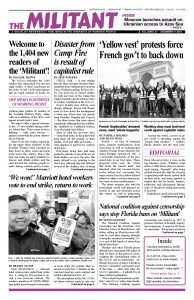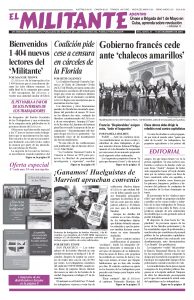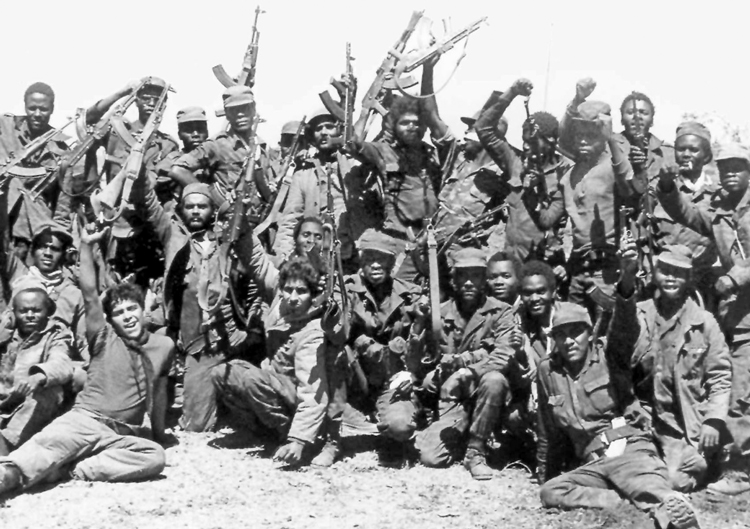Below are excerpts from In Defense of Socialism by Fidel Castro. The book contains four speeches by the central leader of the revolution given around the 30th anniversary of the 1959 Cuban Revolution. These speeches were given at the high point in the rectification process in Cuba — a fundamental reorientation of the revolution based on voluntary labor and deepening working-class political leadership. Castro led this fight to reverse the growing impact of bureaucratism and capitalist methods on working-class consciousness and morale. The victory of Cuba’s internationalist mission against the South African apartheid regime’s invasion of Angola reinforced this battle. The excerpt is from a Dec. 5, 1988, speech, “As Long As the Empire Exists, We Will Never Lower Our Guard.” Copyright © 1989 by Pathfinder Press. Reprinted by permission.
BY FIDEL CASTRO
We are a small country — an island, what’s more — located many thousands of kilometers away from any potential or real allies; ninety miles away from not just the most powerful imperialist power on earth but also the most high-handed and arrogant one. Or as we have pointed out on other occasions, we are not even ninety miles away but just a few millimeters, a few microns, from a piece of our territory illegally occupied by them.
That empire still is and will continue to be, perhaps for a long time to come, just that: an empire, and a powerful one at that.
We are the first socialist country in the Western Hemisphere, the first socialist country in Latin America, the last one to free itself from Spain, the first one to free itself from U.S. imperialism, [Applause] the first one to establish full control over its own wealth, the first one to disobey their orders, the first one to challenge them, the first one to carry out the deepest of revolutions on the basis of new concepts, new ideas, new values.
We have been the first country to raise aloft the banner of the workers, the peasants, the poor, and to implement their demands and rights. We have been the first country to set the example corresponding to this stage of historical development of the peoples of Latin America. We have upheld those banners and that attitude for nearly thirty years, and the empire will never forgive us for that.
But it’s not just a question of wounding the empire’s pride but also of causing a great injury to its imperial interests. We are a symbol, we are the road to rebellion, freedom, and independence.
And the empire will never stop trying to crush that symbol, that example, that road one way or another. As long as the imperial domination of our hemisphere exists, that is and will continue to be their goal.
Even if the day were to come when relations between socialist Cuba and the empire improve formally, that would not stop the empire from trying to crush the Cuban revolution. And they don’t hide it; their theoreticians explain it, the defenders of the imperial philosophy explain it. There are some people who say it’s better to make certain changes in their policy toward Cuba in order to penetrate it, weaken it, destroy it — peacefully, if possible. Others think that the more belligerence shown toward Cuba the more active and effective Cuba will be in its struggles on the Latin American and world scene.
Therefore, there is something that must be the essence of Cuban revolutionary thought; there is something that must be absolutely clear in the consciousness of our people, who have had the privilege of being the first to travel this road: and it is the awareness that as long as the empire exists we will never be able to lower our guard, to neglect our defense. [Applause] …
The question of our defense was never in anyone’s hands but our own. [Applause] It’s very important that we realize this! We were never defended by nuclear missiles. We have nothing to gain or lose in this regard if some missiles of one type or another are dismantled or even if there is universal nuclear disarmament — something which unfortunately does not appear to be so close at hand — since our defense never depended on short-, intermediate-, or long-range missiles. …
We know that the United States had some sleepless nights over the kind of boldness whereby a small, blockaded and threatened country like Cuba was capable of carrying out an internationalist mission of this nature. The empire can’t conceive of this. They are the only ones in the world who are entitled to have troops everywhere, weapons everywhere, bases everywhere. And so the fact that a small Caribbean country was capable of providing support to a sister African nation is something beyond their parameters, concepts, and norms.
It’s clear that this internationalist mission carried out by Cuba had a very big impact on Africa. The African peoples, and even African governments that are not revolutionary but belong rather to the right have viewed with admiration the mission carried out by Cuba in Africa. The African peoples know these are troops allied with them; they know that the only non-African country whose troops were sent to defend an African country against the aggression of racist and fascist South Africa is Cuba. [Applause] …
There are some who have even dared question the internationalist spirit and heroism of our people, who have criticized it. This is the Yankees’ hope: that anti-internationalist currents would arise among our people to weaken us. As we have said before, being internationalists is paying our debt to humanity. [Applause] Whoever is incapable of fighting for others will never be capable of fighting for himself. [Applause] And the heroism shown by our forces, by our people in other lands, faraway lands, must also serve to let the imperialists know what awaits them if one day they force us to fight on this land here. [Applause and shouts]


